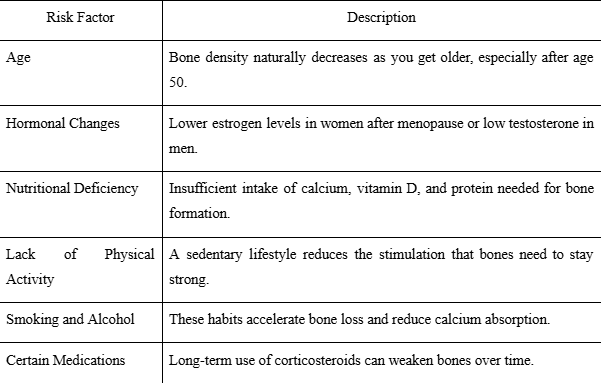By: Geraldus Sigap
What is Osteoporosis?
Osteoporosis is a condition in which bone density and strength gradually decrease, making bones fragile and more prone to fractures, even from minor falls or mild pressure. It is often called a silent disease because it develops without symptoms in the early stages, and is usually discovered only after a fracture occurs. Osteoporosis can affect anyone but is most common among postmenopausal women, elderly individuals, and those with low calcium intake or an inactive lifestyle.
Without early prevention and proper management, the risk of fractures, especially in the hip, wrist, and spine, can increase significantly.
Symptoms of Osteoporosis to Watch For
Although it often develops silently, there are warning signs you shouldn’t ignore:
- Chronic back pain, particularly in the lower back or spine
- Gradual loss of height due to compression of the spinal bones
- Stooped posture (kyphosis)
- Fractures from minor falls or small impacts
- Decreased grip strength and muscle weakness
If you experience any of these symptoms, it’s important to have your bone health evaluated as early as possible.
Causes and Risk Factors
Several factors can increase the risk of developing osteoporosis:

How is Osteoporosis Diagnosed?
The most accurate way to assess bone health is through a Bone Mineral Density (BMD) test using a BMD DXA scan (Dual-Energy X-ray Absorptiometry).
This test can detect bone loss even before a fracture occurs, allowing early intervention and prevention. At RS Abdi Waluyo, BMD DXA examinations are performed by trained professionals using international-standard equipment, ensuring accurate, quick, and pain-free results.
How to Prevent and Manage Osteoporosis
Preventing osteoporosis starts early, by adopting a healthy lifestyle and maintaining good nutrition to support bone strength.
- Get Enough Calcium and Vitamin D
- Eat foods rich in calcium such as milk, cheese, yogurt, sardines, and leafy greens.
- Morning sunlight helps your body produce vitamin D, which is essential for calcium absorption. If sunlight exposure is insufficient, vitamin D can also be taken as a supplement. The recommended dosage for adults is around 600–800 IU per day, or as advised by your doctor. This helps maintain optimal vitamin D levels in the body, ensuring effective calcium absorption and stronger bones.
- Stay Physically Active
- Engage in weight-bearing exercises like brisk walking, light jogging, cycling, or resistance training.
- Regular physical activity strengthens both muscles and bones.
- Avoid Habits That Harm Bone Health
- Limit alcohol consumption and stop smoking.
- Reduce excessive caffeine intake, which can interfere with calcium absorption.
- Schedule Regular Check-Ups
- Have your bone density screened regularly, especially if you’re a woman over 50 or a man over 60.
- Early screening allows doctors to start preventive measures before complications arise.
- Medical Treatment
If diagnosed with osteoporosis, your doctor may prescribe bone-strengthening medications such as bisphosphonates, calcitonin, or synthetic estrogen.
In certain cases, combination therapies are used to help reduce fracture risk and maintain bone mass.
Possible Complications
Without proper treatment, osteoporosis can lead to serious complications such as:
- Hip fractures, which often require major surgery and lengthy recovery
- Spinal deformities due to compression fractures
- Chronic pain that interferes with daily activities
- Loss of mobility and increased risk of permanent disability
That’s why early detection and consistent care are key to maintaining bone health and quality of life.
RS Abdi Waluyo provides specialized care through its Orthopaedic & Spine Department, offering a comprehensive approach for bone health and osteoporosis management. Available services include: Orthopaedic consultation, Bone density (BMD DXA) testing, Personalized osteoporosis therapy, and Rehabilitation programs for bone strength and posture correction. Contact RS Abdi Waluyo at 021-3144989 or make an online appointment via https://abdiwaluyo.com/
FAQ
- Is osteoporosis only a women’s disease?
No. While it’s more common in postmenopausal women, men can also develop osteoporosis, especially with age or unhealthy lifestyle habits. According to the World Health Organization (WHO), approximately 1 in 3 women over the age of 50 will experience fractures related to osteoporosis, compared to 1 in 5 men in the same age group. The higher risk in women is primarily due to a decline in estrogen levels after menopause, a hormone essential for maintaining bone density.
- When should I get my bone density checked?
Screening is recommended from age 50, or earlier if you have risk factors such as family history, long-term steroid use, or early menopause.
- Can osteoporosis be completely cured?
Osteoporosis cannot be fully reversed, but it can be managed effectively with proper treatment, lifestyle changes, and regular follow-up.
- Does back pain always mean osteoporosis?
Not always, however, if it’s accompanied by a decrease in height or a stooped posture, you should consider a BMD DXA scan.
- Can physiotherapy help osteoporosis patients?
Yes, physiotherapy improves balance, muscle strength, and coordination, reducing the risk of falls and fractures.
Referensi:
- Rosen CJ. The Epidemiology and Pathogenesis of Osteoporosis. [Updated 2020 Jun 21]. In: Feingold KR, Ahmed SF, Anawalt B, et al., editors. Endotext [Internet]. South Dartmouth (MA): MDText.com, Inc.; 2000-. Available from: https://www.ncbi.nlm.nih.gov/books/NBK279134/
- Föger-Samwald, U., Dovjak, P., Azizi-Semrad, U., Kerschan-Schindl, K., & Pietschmann, P. (2020). Osteoporosis: Pathophysiology and therapeutic options. EXCLI journal, 19, 1017–1037. https://doi.org/10.17179/excli2020-2591
